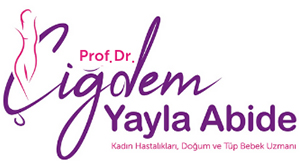A 30-year-old woman has a 20 per cent chance of conceiving naturally in the first month. In other words, one out of every 5 women can get pregnant without treatment at the end of the first month. After 6 months, this rate is around 75%. Among the treatments applied to women who cannot get pregnant naturally, the one with the highest chance of success is ‘in vitro fertilisation’.
IVF success rates may vary depending on many factors. The most curious question among couples; ‘What is the success rate of IVF?’, ‘Where can success rates be found?’
IVF success rates are usually expressed as IVF pregnancy rate and most clinics indicate how many pregnancies can be achieved per treatment. IVF success rates can vary from country to country, from clinic to clinic and even within a clinic. In fact, the real success is sending couples home with a baby in their arms.
What is the percentage of success rate in the first attempt? What are the chances of a second IVF? In general, the success rate of IVF treatment can vary between 50 and 70 per cent. However, in individual cases these rates can be much higher or lower. Since there are many factors that influence success rates, it is important for couples to discuss their personal situation in detail with their doctor.
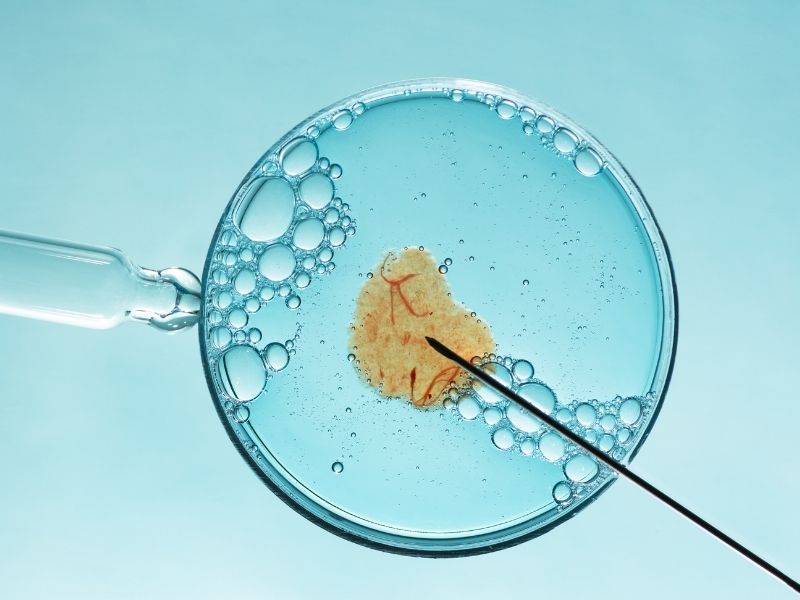
IVF Success Rate
What is the IVF Success Rate?
What needs to be done toincrease the chance of IVF is not limited to the treatment process. The couple should be well evaluated before treatment. Anatomical problems that may reduce the success of IVF, adhesions in the uterus, swelling in the tubes and similar conditions should be corrected before IVF treatment, vitamin support should be started, and a healthy lifestyle should be adopted. During the treatment period, IVF success rates may vary depending on the age of the woman, the number of eggs, the treatment methods used, the clinical experience of the infertility specialist, the technological equipment of the IVF centre, the experience of the embryology specialist and many other factors I will mention below.
What are the Factors Affecting the Success of IVF Treatment?
IVF success rate calculation varies according to many factors. Factors affecting success in IVF, i.e. factors affecting IVF retention rates; female age, egg number and quality, embryo number and quality, female reproductive health status, laboratory quality of the IVF centre (technological equipment of the IVF centre), embryo genetic status, IVF treatment methods and protocols applied, IVF experience of the obstetrician, general health of the couple, genetic factors and experience of the embryology specialist.
Even if the woman's age is advanced, it is possible to achieve first embryo transfer success with a single good embryo obtained with good quality eggs and sperm. There is always a chance of IVF with a single egg.

Success in IVF Treatment
How old should the woman be in IVF?
How does the woman's age affect the success rate of IVF? Young women usually have higher fertility rates. Therefore, IVF treatment success rate is generally higher in young women. As the age of women increases, the possibility of genetically defective eggs and genetically defective embryos increases. For this reason, as the age increases, the chance of in vitro fertilisation decreases. Therefore, it is important for couples who want to have children to apply for IVF treatment as early as possible. At a young age, the likelihood of good quality eggs and good quality embryos is higher.
Although the chances of getting pregnant with the first IVF attempt vary according to many factors and IVF centres, they are generally as follows;
- In women younger than 35 years of age, the success rate, i.e. conception rate, is 60-70%.
- The pregnancy rate between the ages of 35-37 is 40-45 per cent.
- The pregnancy rate between the ages of 38-40 is 30
- In women over 42 years of age, the pregnancy rate in IVF is 5 %.
Is Egg Number and Egg Quality Important in IVF?
As the number of eggs and egg quality increases, the success rate of IVF increases. The reasons for IVF failure can be shown as problems in egg quality or poor quality embryos.
The number of eggs significantly affects the success of IVF, but it is not the only effective factor on the chance of IVF. Obtaining more eggs in IVF provides more embryo options and increases the chance of IVF success. However, too high a number of eggs can also have negative effects. For example, the risk of ovarian stimulation syndrome may increase. It is therefore important that the number of eggs is balanced. Day 5 embryo formation is the most important criterion affecting the chance of IVF success. Especially women with low ovarian reserve should be aware of the possibility of in vitro fertilisation with a single egg.
Egg quality is more important than the number of eggs and directly affects embryo formation and the chance of a healthy pregnancy. When quality eggs are combined with quality sperm, quality embryos are formed and the IVF pregnancy rate increases. Younger women usually have higher quality eggs, which increases the success of IVF treatment. In addition, older women or women with certain health problems may have lower quality eggs, which may reduce the success rate.
Inlow ovarian reserve, the number of eggs collected after the egg enlargement drugs and hatching needle we give in IVF treatment is less than 3. If the number of eggs collected in IVF treatment is above 15-20, it is called ‘high ovarian reserve’. In polycystic ovary patients, the number of eggs collected in IVF treatment is high and the chance of success in polycystic ovary IVF is high.
The ability of the eggs to fertilise or fertilisation rate is another important factor affecting success. A higher fertilisation rate increases the chance of obtaining more healthy embryos.
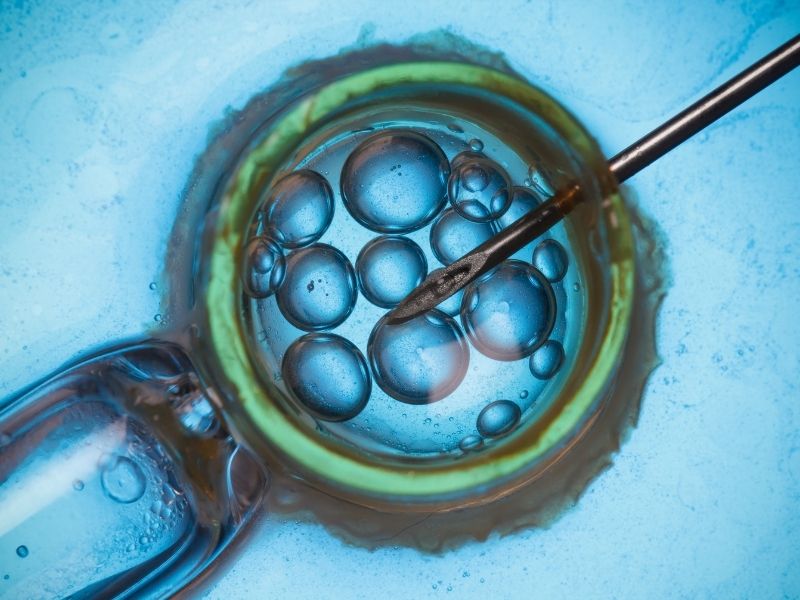
Number of Embryos in IVF
Embryo Number and Embryo Quality in IVF
Embryo quality is evaluated according to the number, shape and size of the cells. Embryos can be transferred on the 3rd, 5th or 6th day. However, our preference is to transfer embryos on day 5 to increase the success of IVF. Day 5 embryos are of better quality and have a higher chance of keeping the pregnancy, but it does not show that they are genetically normal embryos. The answer to the question ‘Why does IVF fail?’ is most likely low embryo quality. Therefore, embryo genetic examination to detect chromosome problems in couples with recurrent IVF failures increases success.
Reproductive Health Status of Woman
The woman's reproductive health status is also very important. Uterine structure, ovarian reserve, hormonal balance and the health of other reproductive organs can affect the success of treatment. Uterine anomalies (presence of uterine anomalies such as uterine curtain, uterine adhesion, T-shaped uterus, Y-shaped uterus), ovarian cysts, fluid accumulation in the tubes (swelling in the tubes, hydrosalpenx) may adversely affect the success of IVF treatment. Fluid accumulation in the tubes is a cause of in vitro fertilisation failure and can also cause miscarriages.
Male Reproductive Health (Sperm Count and Sperm Quality)
The quality and quantity of the man's sperm is also important in IVF pregnancy rates. Low sperm quality or quantity may adversely affect the success of IVF treatment.
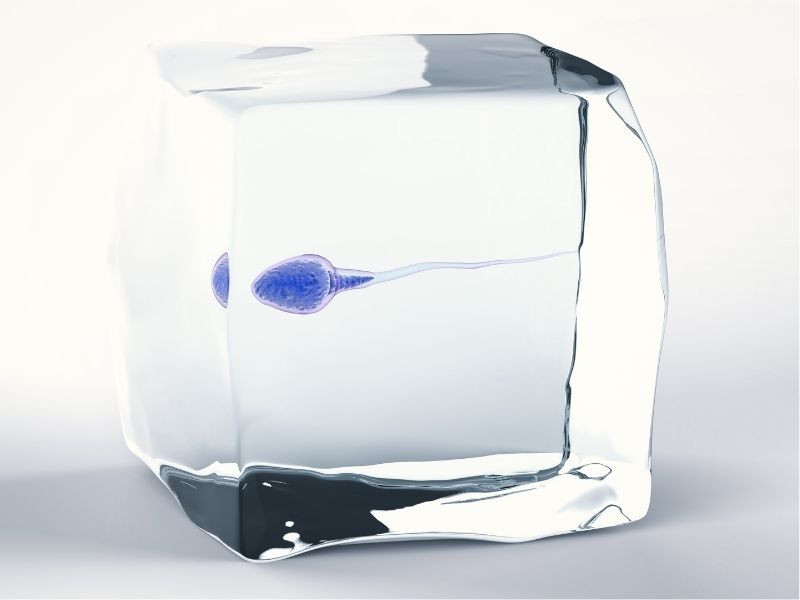
Male Reproductive Health
IVF Treatment Methods and Protocols
The treatment methods and protocols used also affect the results. For example; factors such as which drugs are used, when the eggs are retrieved, how the embryos are transferred can determine the success of the treatment. In this regard, the experience of the IVF specialistis very important.
IVF Experience of the Gynaecologist
The experience and expertise of the clinic is very important in IVF treatment. An experienced team and a good infrastructure increase the chances of success.
General Health of the Couple
Do habits such as smoking and alcohol affect the success rate of IVF? The general health of both the woman and the man can affect the success of IVF treatment. A healthy lifestyle, eating habits and quitting harmful habits such as smoking and alcohol can increase the success of the treatment.
Are Genetic Factors Effective in IVF?
Some genetic factors may affect the success of IVF treatment. Especially if there are recurrent miscarriages or genetic disease risks, it may have an effect on the success of IVF.
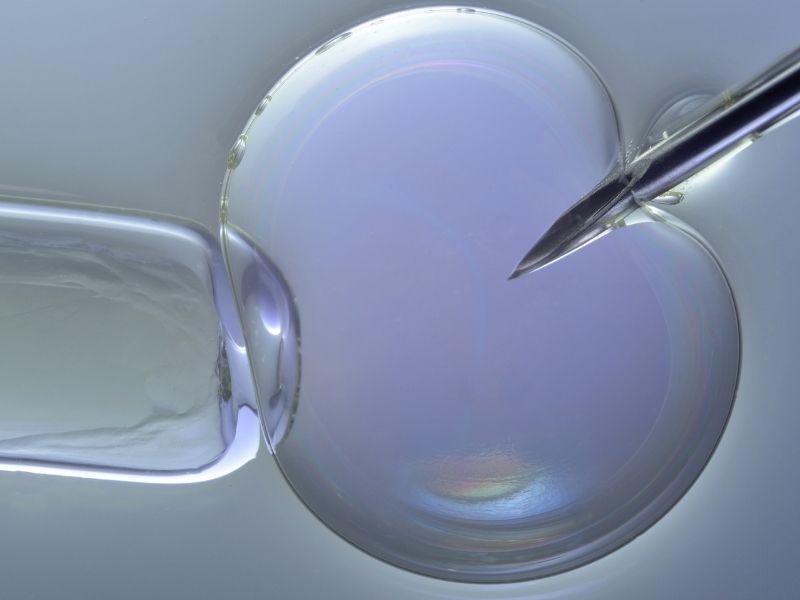
IVF Centre
IVF Centre Technological Equipment and Embryology Specialist's Experience
A critical factor determining IVF success rates is the quality of the IVF centre. The laboratory technology of the centre, the breadth of treatment options, the use of high quality and state-of-the-art equipment can directly affect the embryo development process and the quality of the embryos formed.
High Technology Requirement: IVF is a highly sensitive process and requires state-of-the-art equipment. It is especially important to use advanced equipment in stages such as embryo culture and monitoring, egg collection and fertilisation procedures.
Precision and Accuracy: The precision and accuracy of the equipment used during the IVF procedure can determine the chance of success. For example, the correct operation of micro-manipulators and embryo monitoring systems used in embryo transfer can affect success.
Sterilisation and Quality Control: IVF is a procedure that must be performed under sterile conditions. Therefore, sterilisation and quality control of the equipment is extremely important. Any contamination or quality problem can reduce the chances of success.
Efficiency and Reliability: A good IVF centre ensures that the equipment used during the procedure is efficient and reliable. Defective or unreliable equipment can disrupt the process or cause failure.
Innovation and Development: Technological developments in the field of IVF are constantly continuing. A good IVF centre follows innovative equipment and constantly tries to increase treatment success by using up-to-date technologies.
In order to obtain high quality embryos, the preparation phase after egg collection and the selection of suitable sperm, the meticulous execution of the fertilisation process between egg and sperm, requires the cooperation of an experienced and careful team. In addition, modern devices and methods used in the laboratory environment play a critical role in the success of IVF treatment.
Technologies such as IMSI and ICSI can help to select the healthiest sperm cellsand ensure successful fertilisation. Innovative devices such as embryoscopes for continuous monitoring of embryos, artificial intelligence, genetic analysis methods such as NGS, piezo methods and calcium ionophores can also improve fertilisation, IVF success rates and optimise embryo quality. The availability of such methods in the embryology laboratory increases the chances of IVF success.
In conclusion, the technological infrastructure of IVF clinics and the methods used are important determinants of treatment success. Up-to-date technology and an expert team are required to obtain high quality embryos.
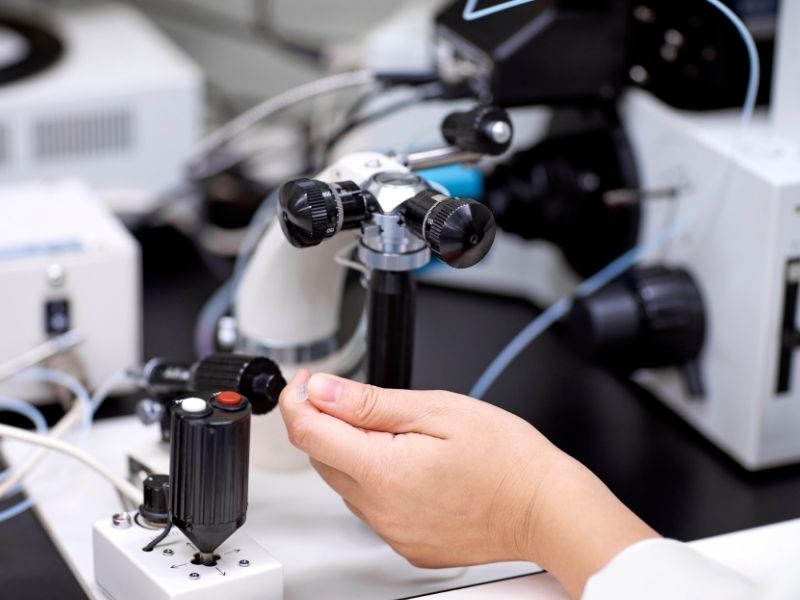
Embryo Transfer in IVF
Embryo Transfer in IVF
Embryo transfer is a stage that significantly affects the success of IVF treatment. Here are some of the main ways in which embryo transfer affects the success of IVF treatment:
IVF Pregnancy Rates: Embryo transfer means placing the embryo in the uterus. Successful embryo transfer supports the healthy placement of the embryo in the uterus and the onset of pregnancy. Therefore, a successful embryo transfer increases IVF pregnancy rates.
Success Rate in IVF First Trial: Embryo transfer is one of the most important stages of IVF treatment and can often determine the success of the treatment in a single attempt. A successful transfer can reduce the need for repeated IVF attempts.
Morphological Quality: The quality of the embryo used during embryo transfer directly affects success. Transfer of morphologically healthy and normal embryos increases the chance of pregnancy.
Endometrial Compatibility: Before embryo transfer, the suitability of the inner lining of the uterus (endometrium) is evaluated. A suitable endometrium supports the successful attachment and development of the embryo. Therefore, the suitability of the uterine lining is a critical factor affecting the success of embryo transfer.
Transfer Techniques and Protocols: The techniques and protocols used during embryo transfer affect the success. Specialised embryo transfer techniques and appropriate protocols support the successful implantation of the embryo into the uterus.
IVF Clinical Experience and Expertise: Embryo transfer should be performed by an experienced and expert IVF team. Clinical experience and expertise can increase the success of the transfer.
Embryo transfer is a critical stage of IVF treatment and success is achieved when many factors come together. Because each patient is different, embryo transfer must be carefully planned and managed before and after the embryo transfer.
Embryo transfer is a painless procedure and does not require anaesthesia, but some patients can have embryo transfer with anaesthesia.
During embryo transfer, medications that reduce the contraction of the uterine muscle can be given, but it is important to choose the right patient.
Each of these factors, which are effective in IVF success rates, affects the success of IVF treatment and should be taken into consideration when planning the treatment. During the treatment process, it is important for couples to be in close co-operation with their doctors and to exchange detailed information about treatment options.

IVF treatment
What should be done for IVF treatment?
In vitro fertilisation (IVF) treatment is a method used by couples when they cannot have a child naturally. The treatment process is quite complex and includes a series of steps. Here are the general steps for IVF treatment:
Initial Evaluation of IVF Treatment: The first step for IVF is to see a specialist doctor. Here, the medical history of the couple is examined in detail and information is given about appropriate treatment options. The woman is examined and ultrasounded, hormone tests are performed, a uterine film is taken and a sperm test is requested from the man. If an underlying disease is detected in the woman, it is treated. In the presence of uterine septum, adhesion, fibroids and polyps compressing the inner lining of the uterus, hysteroscopy is performed before in vitro fertilisation. This is because embryo transfer should be made to a healthy uterus in order to increase the chance of IVF. Problems in sperm count or quality can sometimes be treated before IVF. Therefore, a urological doctor should be consulted in the presence of sperm problems.
Creating a Treatment Plan: The doctor prepares a special treatment plan after assessing the condition of the couples. This plan is personalised according to the needs and health status of the couples. In our clinic, personalised in vitro fertilisation is applied. Some antioxidant and vitamin support may be recommended at this stage. In cases such as insulin resistance and diabetes, which may adversely affect the course of pregnancy, some additional drugs that regulate blood sugar should be added to IVF treatment.
Hormonal Stimulation: A process is initiated that stimulates the ovaries of women with hormone drugs and encourages the development of more than one egg. This allows the ovaries to produce more eggs. The drugs and doses administered at this stage are very important in terms of increasing the chance of in vitro fertilisation.
Egg Collection: As the eggs mature, the doctor performs a procedure to collect the eggs. This procedure is usually performed under light sedation and the eggs are collected under ultrasound guidance. The experience of the doctor and the embryology laboratory is very important at this stage.
Sperm Sample What isthe male factor in IVF? During the egg collection from the woman, a healthy sperm sample is also collected from the man. This sample must contain the quality sperm cells necessary for fertilisation. Correction of the male factor in IVF treatment can increase the chances of IVF success. Reduced sperm count or deformity may adversely affect the success of IVF. Hormone tests and genetic analyses should be performed if there are no sperm in the semen or if the sperm count is severely reduced. Correcting irregularities in hormone levels can help to increase the sperm count.
In the absence of sperm, sperm can be biopsied from the testicles with a needle on the day of egg retrieval. In case of sperm deformities, recommendations such as smoking cessation, weight loss (diet and exercise), some vitamin and antioxidant treatments can be made. In severe sperm deformities, sperm can be extracted from the testicles with a needle using the microtese method. These measures can contribute to the positive influence of the male factor in the treatment process and the success of IVF treatment.
Fertilisation and Embryo Development: The collected eggs are fertilised in the laboratory. Then, the developing embryos are monitored for several days and the healthiest ones are selected.
Embryo Transfer: The selected healthy embryos are transferred to the uterus. This procedure is quick and relatively painless and usually does not require anaesthesia.
Each step in the IVF treatment process takes place with the close co-operation of the couple and the careful guidance of the doctor. Being in a supportive environment and following the advice of an experienced IVF doctor can increase the chances of success.
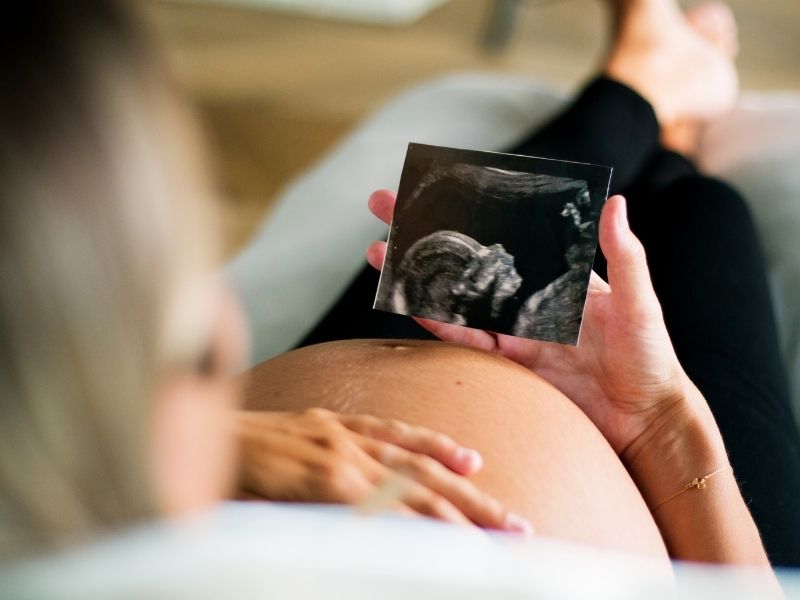
Increasing Success in IVF
Is Artificial Intelligence Important to Increase Success in IVF?
In vitro fertilisation artificial intelligence is a method used for embryo and sperm selection using the power of computer technology. You can reach our article from the title ‘Artificial intelligence in IVF’.
Is Piezo Method Important to Increase Success in IVF?
It is a method that enables activation in the eggs with the help of electric current given to the eggs. You can reach our article from the title ‘Piezo method in IVF’.
Is Embryo Glue Important to Increase Success in IVF?
Embryo glue used in IVF treatment is a special liquid. You can reach our article titled ‘Embryo Glue in IVF ’.
Curious Questions to Increase IVF Success Rate
Do Herbal Treatments Work to Increase IVF Success Rate?
Information from social media or hearsay herbal treatments may have harmful effects instead of being beneficial to you in IVF treatment. Therefore, we do not recommend using unknown herbal cures without consulting your IVF doctor. Healthy nutrition is very important. Vitamin and antioxidant treatment in IVF should be used as recommended by your IVF specialist.
At What Number of Trials Does IVF Work?
What is the IVF first trial success rate? What is the IVF second trial success rate? What is the IVF third trial success rate? It is one of the most frequently asked questions by couples who will start IVF treatment.
First of all, I would like to say this; IVF success rates increase significantly with personalized IVF treatment. The experience of the IVF specialist is very important here.
Couples with high IVF success rates can usually get pregnant with their first IVF treatment. If the woman is young, has a good number and quality of eggs, and has no deterioration in sperm parameters, she can get pregnant with her first IVF attempt. The IVF success rate is around 70% in this group. If IVF does not work on the first attempt, the second IVF attempt or the 3rd IVF attempt does not reduce the chance of IVF success and pregnancy can be achieved. If IVF does not work after the 3rd attempt, this situation is called ‘recurrent IVF failure’. In this case, the couples should first be re-evaluated, the treatment should be reviewed, the drugs and doses used should be changed, and a personalized treatment plan should be created again. You can access detailed information about ‘recurrent IVF failure’ by clicking on this title.
In addition, general health status and lifestyle increase the chance of IVF success. Leading a healthy lifestyle positively affects the success of IVF treatment. Factors such as smoking, excessive alcohol consumption and obesity can reduce the IVF success rate.
What is the First IVF Trial Success Rate?
The success rate in the first IVF trial increases especially depending on the woman's age and the number of eggs collected. The first IVF trial success rate, which is around 30-40% at the age of 35-40, decreases significantly in older ages. The most important factor that reduces the chance of success in the first IVF trial is the decrease in the quality and number of eggs with age. Because as age increases, genetic problems in the eggs increase.
What is the Success Rate in the 2nd IVF Trial?
The IVF success rate is similar to the first 3 IVF trials. In the event of failure in the first IVF trial, couples sometimes despair. However, it should be known that the success rates do not decrease in the 2nd IVF trial. If the couple has frozen embryos, transferring these embryos in the 2nd IVF trial does not reduce the chance of IVF success. In couples without frozen embryos, IVF treatment is started again.
What should be done after an unsuccessful trial? In cases where the first trial is unsuccessful, the couple's hormones, hysterosalpingography, and sperm analysis should be reviewed again to increase the success rate in the 2nd IVF trial. The applied treatment plan should be re-evaluated. In the 2nd IVF trial, drug doses and protocol changes can be made, and an additional treatment plan can be drawn. In addition, new technologies such as the piezo method, artificial intelligence, and embryo glue can be used.
What is the Success Rate in 3. IVF Trials?
Before the third IVF trial, it is important for couples to meet with their doctors in detail and evaluate the results obtained in previous trials. This evaluation can help determine possible precautions that can be taken to increase the chance of success of the treatment. It is also important for couples to review their lifestyles and take care to live a healthy life.
It is important to detect genetic problems when age increases or in cases of repeated IVF failures. For this reason, genetic analysis should be performed on couples and genetic examination should be performed on embryos in case of genetic problems. As a result of embryo genetic analysis, the IVF success rate increases to 80%.
After 2 unsuccessful IVF trials, the presence of hormone problems (such as thyroid and prolactin hormones) should be investigated again. If the hysterosalpingogram is old and there is a history of abortion in between, the mother-to-be should have another HSG (hysterosalpingogram). Adhesions in the uterus (uterine adhesions) can cause miscarriages. The success rates of IVF treatment performed after hysteroscopy increase significantly.
In case of recurrent IVF failure, miscarriages are observed after embryo transfer in case of fluid accumulation in the tubes called hydrosalpinx. This toxic fluid accumulated in the tubes spills into the uterus and prevents the embryo from attaching to the inner wall of the uterus. Therefore, tubal ligation is recommended before embryo transfer.
In case of fluid accumulation in the uterus, infection should be considered and treated with antibiotics. If intrauterine fluid accumulation cannot be treated with antibiotics, hysteroscopy should be performed due to intrauterine adhesion.
Recurrent IVF failures should be examined like recurrent miscarriages. Therefore, acquired thrombophilia panel (thrombophilia tests, antiphospholipid antibody tests) should be examined. In some patients, hereditary thrombophilia panel should also be checked and genetic coagulation problems should be examined.
How Many Eggs Can Be Used to Get Pregnant in IVF Treatment?
Is 1 Egg Enough to Get Pregnant? Many factors affect IVF success rates. In the case of a large number of good quality eggs and a young woman's age, the chance of IVF success increases significantly. However, pregnancy can be achieved even with 1 good quality egg in IVF treatment. The idea that pregnancy cannot be achieved when the number of eggs is low is not true. Therefore, IVF treatment should be started without despair, even if there is 1 egg. There is no single important factor in IVF treatment success.
Can't a Woman Get Pregnant with IVF at an Advanced Age?
If the woman is older, pregnancy can be achieved with IVF. Even at an advanced age, the couple has a high chance of having a baby with a genetically normal, good quality embryo transfer.
How Long Should IVF Trials Be Between?
A period of 2 months is sufficient between two IVF trials. After IVF treatment, 2 months is enough time for the uterus and ovaries to recover from the effects of hormones and for the couple to prepare for the second IVF trial.
Does Intralipid Treatment Increase IVF Success?
IVF intralipid treatment is a method applied to women with immune system-related problems in IVF treatment. IVF intralipid treatment aims to regulate immune system reactions that affect embryo implantation. However, there is no clear evidence as to whether IVF intralipid treatment increases IVF success rates. Some small-scale studies have suggested that this treatment may increase implantation rates, but this has not been supported by large-scale studies. Therefore, more research is needed to reach a definitive conclusion about the effectiveness of intralipid treatment. Every patient is different and the treatment plan should be determined according to individual needs. Therefore, it is important to consult a reproductive health specialist in detail before making a decision on whether IVF intralipid treatment should be applied. The reproductive health specialist evaluates the patient's specific situation and recommends the most appropriate treatment option.
Does Being Overweight Reduce the Chances of IVF Success?
A woman being overweight can negatively affect the success of IVF treatment. Excessive weight can cause hormonal imbalances, decreased egg quality, and reproductive health problems. However, it is possible to reduce these negative effects with weight control and lifestyle changes. Losing weight and adopting a healthy lifestyle under expert supervision can increase the success of IVF treatment.
Does Vitamin D Increase IVF Chances?
Vitamin D plays an important role in a healthy reproductive process. However, there is no definitive evidence as to whether it increases IVF treatment success. Although some studies suggest that vitamin D deficiency may negatively affect IVF treatment success, there is no definitive scientific evidence yet that vitamin D supplements directly increase IVF success.
Vitamin D plays an important role in maintaining hormonal balance in the body and cellular functions. Insufficient vitamin D levels can affect ovarian function and cause ovulation irregularities. For this reason, some experts suggest that optimizing vitamin D levels may increase IVF treatment success.
Since there is no clear evidence as to whether vitamin D supplements increase IVF treatment success, more research is needed on this subject. On the other hand, it is known that vitamin D levels within normal limits have positive effects on general health. Therefore, it is important to check vitamin D levels before and during IVF treatment and to determine the appropriate treatment plan if necessary.



